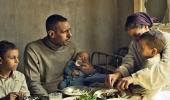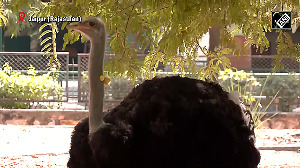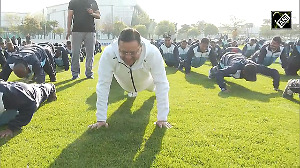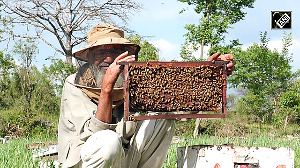2021 may go down in the history of world cinema as having produced the largest number of good quality films from across the world.
What is remarkable is that practically all of these films were made during the pandemic -- just after the first waves subsided in most countries and then later before the second and third waves hit Europe and other continents.
The fact that a diverse group of film-makers were so creative during one of the most difficult two years of our lives is worth celebrating.
Aseem Chhabra lists his favourite films, most of them shown at international film festivals held virtually (Berlinale and Rotterdam), hybrid (Toronto) or physical (Cannes and Venice).
These are good mix of films from Asia, Australia and Europe.
A few films such as The Power of the Dog and The Hand of God are available on streaming platforms. Others are still making rounds of films festivals -- The Worst Person in the World will have its North American premiere at Sundance in January. The rest are slowly getting theatrical releases in the west.
Hopefully, they will become available in India as well, especially at film festivals to be held in the Spring of 2022.
Drive My Car, Japan

Based on a short story by Haruki Murakami, Director Ryûsuke Hamaguchi's Drive My Car narrates the tale of a middle-aged man, Yūsuke Kafuku (Hidetoshi Nishijima), grappling with his wife's sudden death, her infidelities and his challenges to mount a production of Uncle Vanya with a multi-lingual Asian cast.
Partly because he is suffering from glaucoma as well as the rules of the theatre residency he is attending in Hiroshima, Kafuku is forced to hire a driver, Misaki Watari (Tôko Miura), a young woman equally tormented by her own guilts.
As Watari drives Kafuku in his red SAAB, he listens to tape recordings of Uncle Vanya's dialogues in his late wife's voice.
A deeply emotional but a very satisfying film, Drive My Car calls upon us to accept the complexities of life, try to move forward, even when the cobwebs in our mind refuse to clear up, and forgive and understand those who may have wronged us.
Flee, Denmark

There have been many documentaries tracking the harrowing journeys of refugees from the Middle East, Africa and even South Asia but Flee is a cinematic wonder.
For one, when Director Jonas Poher Rasmussen set out to make the film about Amin (a fictional name to protect the identity of the film's protagonist), he obviously had no idea that the Taliban would be back in power in mid-2021.
In narrating the story of a gay Afghan refugee and his family's escape from the Taliban-controlled Afghanistan in the late 1990s, the animated documentary unfolds almost like a work of fiction, a suspense thriller.
It is a moving account of the struggles, the torments and resilience of Afghan refugees, desperately trying to find a way out of the clutches of a ruthless regime.
But the animation, the choice of imagery, colours and touch of humour (Amin's early crushes include Jean-Claude Van Damme, Anil Kapoor and Vivek Mushran) makes Flee stand miles ahead of most international films released this year.
Belfast, UK

In Belfast, Director Kenneth Branagh draws upon his memories of growing up in the Northern Ireland city, defined by riots, and religious strife between Catholics and Protestants.
We see this tough world through the innocent eyes of a young boy Buddy, played by the newcomer Jude Hill, who always has a big wide smile in the film.
Belfast won the Toronto International Film Festival's People's Choice Award.
Under Branagh's guidance, the film turns out to be a heartwarming experience, with pristine black and white cinematography, music and songs by Van Morrison, and strong performances by Judy Dench, Ciarán Hinds (playing Buddy's grandparents) and Jamie Dornan, Caitriona Balfe (as the kid's parents).
The Worst Person in the World, Norway

Director Joachim Trier's protagonist Julie (Renate Reinsve won this year's best actress award at Cannes) is a young, independent woman and love finds its way easily into her heart.
But like many 20-somethings, she is fickle-minded and can also easily fall out of love, sometimes causing a lot of pain to her lovers.
But Reinsve's Julie is so charming, it is impossible to dislike her even as she breaks hearts because we know that she does not wish to intentionally hurt those whose paths cross with hers.
The Worst Person of the Year is a beautiful ode to youth, its follies, regrets and the process by which some people manage to find the right path.
It is romantic, hopeful and full of joy.
Mr Bachman and His Class, Germany

Director Maria Speth's three-and-a-half-hour documentary focuses on Dieter Bachmann, a school teacher in Stadtallendorf, a small town with a large number of Turkish, Russian, Bulgarian, Kazakh and Moroccan immigrants.
Some of Mr Bachman's students were born in Germany, while others are recent arrivals, struggling with the German language and an alien country's culture.
Despite its length, Mr Bachmann and His Class is one of the most engaging and inspiring cinematic experiences where the focus is not just the education but the democratic and secular way in which the children are made to feel they can have a dual identity -- German, as well as that of their country of origin.
Mr Bachmann and His Class celebrates education.
It makes the act of attending school, and especially Mr Bachmann's class a special experience.
No wonder one of the film's most likeable characters -- a tall, wide-eyed Turkish boy says to the teacher, 'Mr Bachmann, I am very fond of you.'
Wheel of Fortune and Fantasy, Japan

The first of the two films Ryûsuke Hamaguchi directed (the other is Drive My Car) during the pandemic and among his shorter works, Wheel of Fortune and Fantasy narrates three stories, set in contemporary Japan. Each story explores loves and relationships of the film's characters.
The stories are unique, at times funny, but also sad.
In the universe that Hamaguchi creates, love, loss, disappointments come hand-in-hand.
There are coincidences but his characters create their own stories based on their imaginations.
With Hamaguchi's two films this year, the world has finally discovered one of the finest young film-makers of our time.
Compartment No 6, Finland

Finland's Compartment No 6 has been compared to Before Sunrise.
A Finnish grad student boards a train from Moscow heading to the Arctic Circle to study ancient rock drawings. In the tiny train compartment, she meets a working-class Russian man (young Russian star Yuriy Borisov), who is uncouth, offensive and drinks a lot. But there ends the comparison with the first part of Richard Linklater's Before Trilogy.
Director Juho Kuosmanen's protagonists do not like each other, but the trip lasts a few days.
Soon, the two start to show some caring and attraction. And in the stunning conclusion scenes, our young travelers make it to the Arctic Circle against all odds.
Romance is accidental in Kuosmanen's film, and when it happens, it is warm, given that the film has taken us to a bleak, cold location.
As it often happens in life, there is no promise or chance to meet again.
Some connections are just that. They start and end soon after.
The Power of the Dog, Australia

With The Power of the Dog, Jane Campion returns to filmmaking after 12 years, although in between she spent time making the two-part Top of the Lake series.
In the new film, Benedict Cumberbatch plays a rancher Phil Burbank annoyed at his brother's (Jesse Plemons) decision to marry a single mother, since it changes the dynamics in the family.
He sets out to make life difficult for his sister-in-law (Kirsten Dunst) and bullies her teenage son (Kodi Smit-McPhee).
But karma bites Phil in more than one way.
Eventually, troubled by past memories, Phil becomes a victim of the dirty game he had started.
With his quiet, menacing persona, hardened face and frightening eyes, Cumberbatch delivers the best performance of his career.
Shot during the pandemic in New Zealand (instead of Montana where the film is set), The Power of the Dog is Campion's exploration of the dark side of masculinity, and a seething power struggle that will haunt the viewer long after the film is over.
Cyrano, UK

Also back on the big screen after a gap, British Director Joe Wright (Atonement, Pride & Prejudice) adapts for the screen the late-nineteenth century French play Cyrano de Bergerac and gives it a twist.
He changes the appearance of Cyrano -- a gifted poet and duelist, with a long nose -- by casting Peter Dinklage (The Game of Thrones), an actor who has the medical condition known as dwarfism.
In fact, Dinklage reprises the role he played in the Broadway version of the play, written by his playwright wife Erica Schmidt.
Dinklage is brilliant, getting into the soul of a man who is unable to express his feelings to the woman he loves, using his eyes and face to show his hurt and disappointment.
Wright's production is lavish, with sumptuous sets, costumes, stunning choreography and music.
Cyrano is a very entertaining film.
The Hand of God, Italy

Paul Sorrentino's The Hand of God owes a lot to Federico Fellini's 1973 classic Amarcord (I Remember).
In both films, the directors revisit their teenage years, where they recall their lives in the world packed with crazy, overbearing, often uncouth relatives.
Men behave badly, women gossip and sometimes suffer. There is sex in the air, but it is all fun.
There are moments of sadness in The Hand of God, but Sorrentino's near-autobiographical tale, set in Naples, rests on the shoulders of the film's very likable 17-year-old protagonist Fabietto Schiesi (first-time actor Filippo Scotti, who is a doppelganger of Timothée Chalamet).
Fabietto wants to become a film-maker, but family pressures keep him at home.
There are small joys, including the arrival of Diego Maradona in Naples, hence the title of the film.
But in all of the whimsical situations, what emerges is Sorrentino's love for the large extended family he creates, many inspired by his own relatives.
And despite the Fellini aroma, the sense of nostalgia in the film feels fresh.
Petite Maman, France

International sensation Céline Sciamma (Portrait of a Lady on Fire) was back earlier this year with one more film exploring the female gaze, although in Petite Maman, she narrates the film from the lens of two little girls.
Having recently lost her grandmother, and with her mother locked up in her own act of mourning, eight-year-old Nelly (Joséphine Sanz) is watched over by her father.
But essentially, she is left to herself.
During a walk through the forest, Nelly encounters another young girl Marion (Gabrielle Sanz, Joséphine's twin in real life). She realises that in Marion, she is meeting her own mother as a child.
Petite Maman is a beautiful film where a child separated from her mother, finally begins to understand her, by connecting with her when she herself was young.
A Hero, Iran

Since the launch of his films About Elly and A Separation at international film festivals, Asghar Farhadi has become the most recognised figure in the Iranian film industry.
His themes remain similar and universal -- the moral and ethical decline of human beings as they seek paths, some not justifiable, to change their situation in society.
A Hero's protagonist Rahim (Amir Jadidi) is jailed since he has not been able to repay his debts.
During a two-day parole, he tries to convince his creditor to withdraw his complaint, but things do not go the way Rahim would like them to.
He ends up dragging his family, his mistress and his young son into a messy situation.
There are never easy solutions in Farhadi's films.
There are no real villains in his stories, they are just ordinary human beings struggling to keep their heads above the water in contemporary Iranian society.
Private Desert, Brazil

In this year's Brazilian entry for the Oscars, a disgraced cop, fired from his job, spends days and nights caring for his father, until one day he decides to focus on his own life.
Daniel (Antonio Saboia) sets out to look for a woman he has been chatting with online.
But the search 1,500 miles away from his home, leads him to unexpected paths, including a meeting with Robson (Pedro Fasanaro), a young, handsome man, who cross-dresses when he goes to clubs at night.
Director Aly Muritiba's second film explores the notion of masculinity in Brazilian society where same-sex desires and relationships are accepted and also frowned upon.
With Bonnie Tyler's Total Eclipse of the Heart playing like a theme song of the film, Private Desert drives us through the terrain of heartaches and disappointments in life.
Muritiba also takes care of his characters, watching over them so they are not left stranded with their pains.
Looking for a Lady with Fangs and a Moustache, Nepal/Bhutan

Bhutanese Buddhist monk and film-maker Khyentse Norbu (The Cup, Travelers and Magicians) has managed to balance his spiritual life with film-making. He often takes off to meditate in the Himalayas and then comes back refreshed with new narratives to explore on film.
In his latest film, Norbu mixes the elements of spirituality with film noir.
The result is a fascinating tale located in the heart of Kathmandu, where a businessman -- upon learning of his imminent death from an eccentric monk who wears big red headphones -- sets out to look for a mysterious lady with a moustache and fangs.
Norbu's film is gorgeously shot by Taiwanese Cinematographer Mark Ping Bin Lee, whose credits include Wong Kar-Wei's In the Mood for Love.
With bright vibrant colours, and imageries of Kathmandu's temples, busy marketplaces and long empty alleys, Looking for a Lady with Fangs and a Moustache is an unexpected, entertaining thriller.
Limbo, Hong Kong/China

The basic premise of Limbo sounds familiar -- an middle-aged jaded cop with a tragic past and a rookie who joins him, as they are assigned to catch a serial killer.
But the uber violent Limbois thoroughly exciting and entertaining.
Shot in sharp monochromatic tones, Limbo's violence looks even more real.
Blood oozing from the bodies of victims or during fight sequences is given a dark black hue, making those images much more gruesome to watch than in a coloured film.
The violence is stylized and the locations, dark alleys, congested apartments and residential blocks, are unsettling.
Hong Kong feels like hell, with the killer chopping off his victim's hands.
It may be a tough watch for those who have a low threshold for violence. But for the rest who like the Hong Kong action genre films, Limbo is a must watch.












 © 2025
© 2025